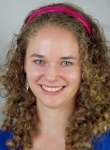By Rachel Sumner

This summer I taught the Thinking Like a Scientist class as part of the 4H Career Explorations program. The Thinking Like a Scientist curriculum was designed by my advisor Wendy Williams, professor of human development in the College of Human Ecology. It consists of a number of modules covering science topics that are of interest to teens. As the instructor of this summer’s 3-day session, I chose which topics we’d cover, presented the material to students, and led discussions with the 24 students in this year’s class.
After teaching this class last year, someone told me that the way the class goes totally depends on the group of students in the class, and I was surprised to learn just how true this is: Last year's group enjoyed thinking about future experiments that could be done, this year's group preferred discussing relevant experiments that have already been done. One year's group liked breaking into smaller groups for discussions, while the other year's group would rather have a discussion all together. One group of students seemed to enjoy building on each other’s ideas, and the other group reveled in respectfully challenging each other’s ideas.
I think one of the best parts of the Thinking Like a Scientist class is its flexibility. Taking part in this class gives students the tools to think about topics that matter to them in a scientific way. Topics like bullying and teen suicide, which have been in the news frequently but are not part of the Thinking Like a Scientist curriculum, were clearly on students' minds. Having the flexibility to discuss these important topics and encourage students to approach them in a scientific way seemed to be beneficial for the students.
The students' favorite part of this year's Thinking Like a Scientist class was probably having lunch with graduate students from different science and engineering fields. They had the opportunity to ask questions about applying to college, deciding what to study, and what kinds of things you get to do as a psychologist, physicist, electrical engineer, or natural resource scientist. Taking part in this discussion reminded me how teens are often equally enthusiastic and nervous about the future, but it’s heartening to see them grapple with serious questions – about science, about their own lives, and about ways to improve the lives of others.
Rachel Sumner is a graduate student in human development in the College of Human Ecology.

